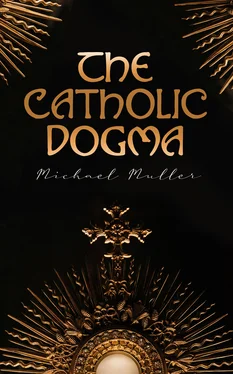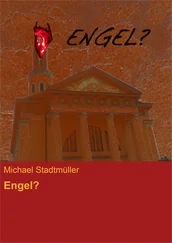1 ...8 9 10 12 13 14 ...18 Now, when men give a loose rein to the depravity of nature, what wonder if the most scandalous practices
Ensue? Accordingly, a striking instance of this kind appeared in the license granted, in 1539, to Philip, Landgrave of Hesse, to have two wives at once, which license was, signed by Luther, Melanchthon, Bucer, and five other Protestant preachers.
On the other hand, a wide door was laid open to another species of scandal: the doctrine of the Reformation admitted divorces in the marriage state in certain cases, contrary to the doctrine of the Gospel, and even allowed the parties thus separated to marry other wives and other husbands.
To enumerate the errors of all the Reformers would exceed the limits of this treatise. I shall therefore only add the principal heads of the doctrine of Calvin and the Calvinists: 1. that baptism is not necessary for salvation; 2. good works are not necessary; 3. man has no free-will; 4. Adam could not avoid his fall; 5. a great part of mankind are created to be damned, independently of their demerits; 6. man is justified by faith alone, and that justification, once obtained, cannot be lost, even by the most atrocious crimes; 7. the true faithful are also infallibly certain of their salvation; 8. the Eucharist is no more than a figure of the body and blood of Christ. Thus was the whole system of faith and morality overturned. Tradition they totally abolished; and though they could not reject the whole of the scripture, as being universally acknowledged to be the word of God, they had, however, the presumption to expunge some books of it that did not coincide with their own opinions, and the rest they assumed a right to explain as they saw fit.
To pious souls, they promised a return to the fervor of primitive Christianity; to the proud, the liberty of private judgment; to the enemies of the clergy, they promised the division of their spoils; to priests and monks who were tired of the yoke of continence, the abolition of a law which, they said, was contrary to nature; to libertines of all classes, the suppression of fasting, abstinence, and confession. They said to kings who wished to place themselves at the head of the Church as well as of the States that they would be freed from the spiritual authority of the Church; to nobles, that they would see a rival order humbled and impoverished; to the middle classes and the vassals of the Church, that they would be emancipated from all dues and forced services.
Several princes of Germany and of the Swiss cantons supported by arms the preachers of the new doctrines. Henry VIII. imposed his doctrine on his subjects: The King of Sweden drew his people into apostasy. The Court of Navarre welcomed the Calvinists; the Court of France secretly favored them.
At length Pope Paul III. convoked a General Council at Trent, in 1545, to which the heresiarchs had appealed. Not only all the Catholic bishops, but also all Christian princes, even Protestants, were invited to come.
But now the spirit of pride and obstinacy became most apparent. Henry VIII. replied to the Pope that he would never intrust the work of reforming religion in his kingdom to any one except to himself. The apostate princes of Germany told the papal legate that they recognized only the emperor as their sovereign; the Viceroy of Naples allowed but four bishops to go to the council; the king of France sent only three prelates, whom he soon after recalled. Charles V, created difficulties, and put obstacles in the way. Gustavus Vasa allowed no one to go to the council. The heresiarchs also refused to appear. The council, however, was held in spite of these difficulties. It lasted over eighteen years, because it was often interrupted by the plague, by war, and by the deaths of those who had to preside over it. The doctrines of the innovators were examined and condemned by the council, at the last session of which there were more than three hundred bishops present; among whom were nine cardinals, three patriarchs, thirty-three archbishops, not to mention sixteen abbots or generals of religious orders, and one hundred and forty-eight theologians. All the decrees published from the commencement were read over and were again approved and subscribed by the Fathers. Accordingly, Pius IV., in a consistory held on the 26th of January, in 1564, approved and confirmed the council in a book which was signed by all the cardinals. He drew up, the same year, a profession of faith conformable in all respects with the definitions of the council, in which it is declared that its authority is accepted; and since that time, not only all bishops of the Catholic Church, but all priests who are called to teach the way of salvation, even to children, nay, all non-Catholics, on abjuring their errors, and returning to the bosom of the Church, have sworn.that they had no other faith than that of the holy Council.
The new heresiarchs, however, continued to obscure and disfigure the face of religion. As to Luther's sentiments in regard to the Pope, bishops, councils, etc., he says, in the preface to his book, De Abroganda Missa Privata: "With how many powerful remedies and most evident Scriptures have I scarce been able to fortify my conscience so as to dare alone to contradict the Pope, and to believe him to be Antichrist, the bishops his apostles, and the universities his brothel-houses;" and in his book, De Judicio Ecclesiae de Grave Doctrina, he says: "Christ takes from the bishops, doctors, and councils both the right and power of judging controversies, and gives them to all Christians in general."
His censure on the Council of Constance, and those that composed it, is as follows: "All John Huss' articles were condemned at Constance by Antichrist and his apostles," (meaning the Pope and bishops), "in that synod of Satan, made up of most wicked sophisters; and you, most holy Vicar of Christ, I tell you plainly to your face, that all John Huss' condemned doctrines are evangelical and Christian, but all yours are impious and diabolical. I now declare," says he, speaking to the bishops, "that for the future I will not vouchsafe you so much honor as to submit myself or doctrine to your judgment, or to that of an angel from heaven." (Preface to his book Adversus falso nominatum ordinem Episcoporum.) Such was his spirit of pride that he made open profession of contempt for the authority of the Church, councils, and Fathers, saying "All those who will venture their lives, their estates, their honor, and their blood, in so Christian a work as to root out all bishoprics and bishops, who are the ministers of Satan, and to pluck by the roots all their authority and jurisdiction in the world,--these persons are the true children of God and obey his commandments." (Contra Statum Ecclesia et falso nominatum ordinem Episcoporum.)
This spirit of pride and obstinacy is also most apparent from the fact that Protestantism has never been ashamed to make use of any arguments, though ever so frivolous, inconsistent, or absurd, to defend its errors, and to slander and misrepresent the Catholic religion in every way possible. It shows itself again in the wars which Protestantism waged to introduce and maintain itself. The apostate Princes of Germany entered into a league, offensive and defensive, against the Emperor Charles V., and rose up in arms to establish Protestantism.
Luther had preached licentiousness, and reviled the emperor, the princes, and the bishops. The peasants lost no time in freeing themselves from their masters. They overran the country in lawless bands, burned down castle and monasteries, and committed the most barbarous cruelties among the nobility and clergy. Germany became at last the scene of desolation and most cruel atrocities during the Thirty Years' War (1618–1648). More than one hundred thousand men fell in battle; seven cities were dismantled; one thousand religious houses were razed to the ground; three hundred churches and immense treasures of statuary, paintings, books, etc., were destroyed.
Читать дальше












